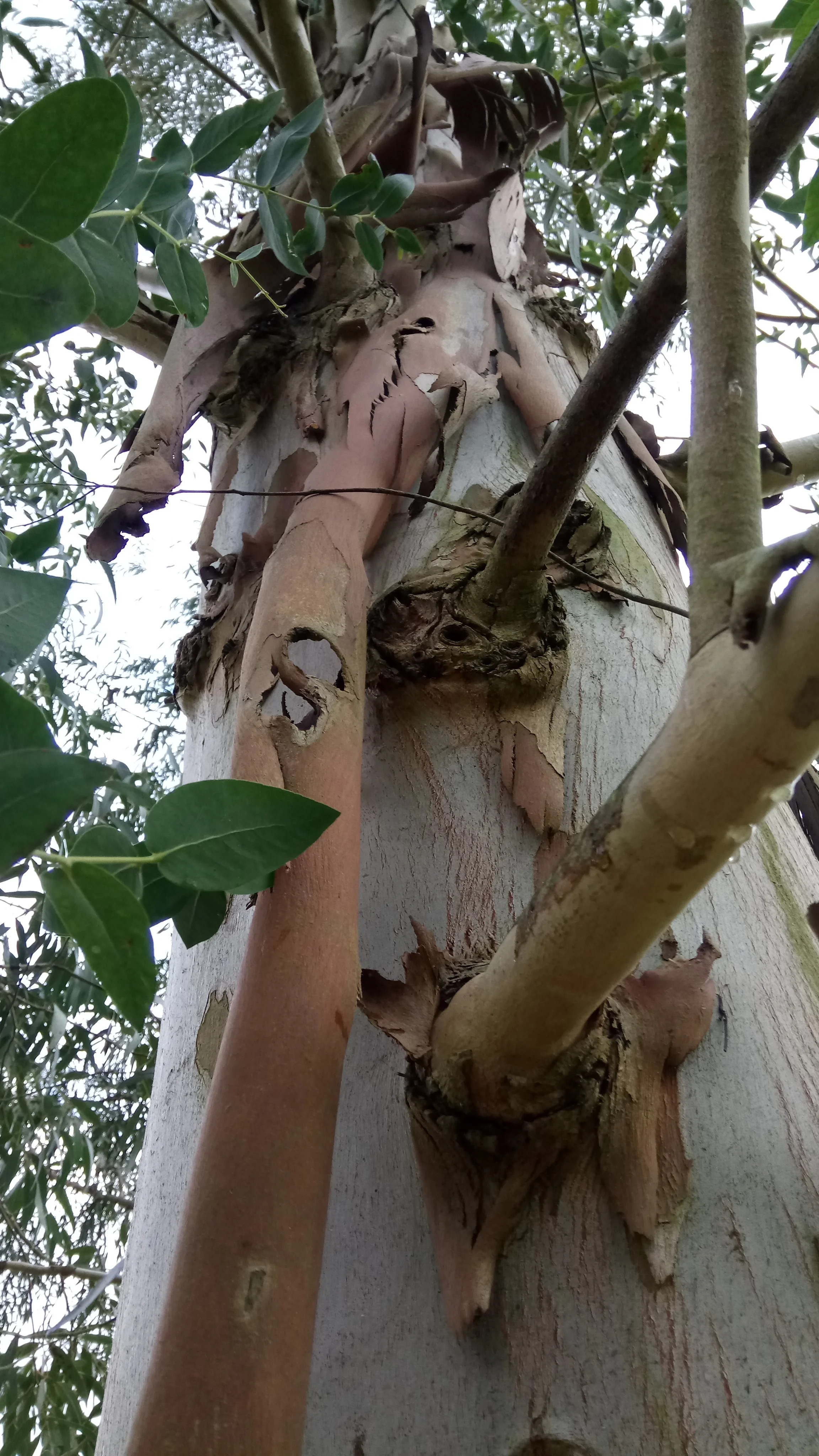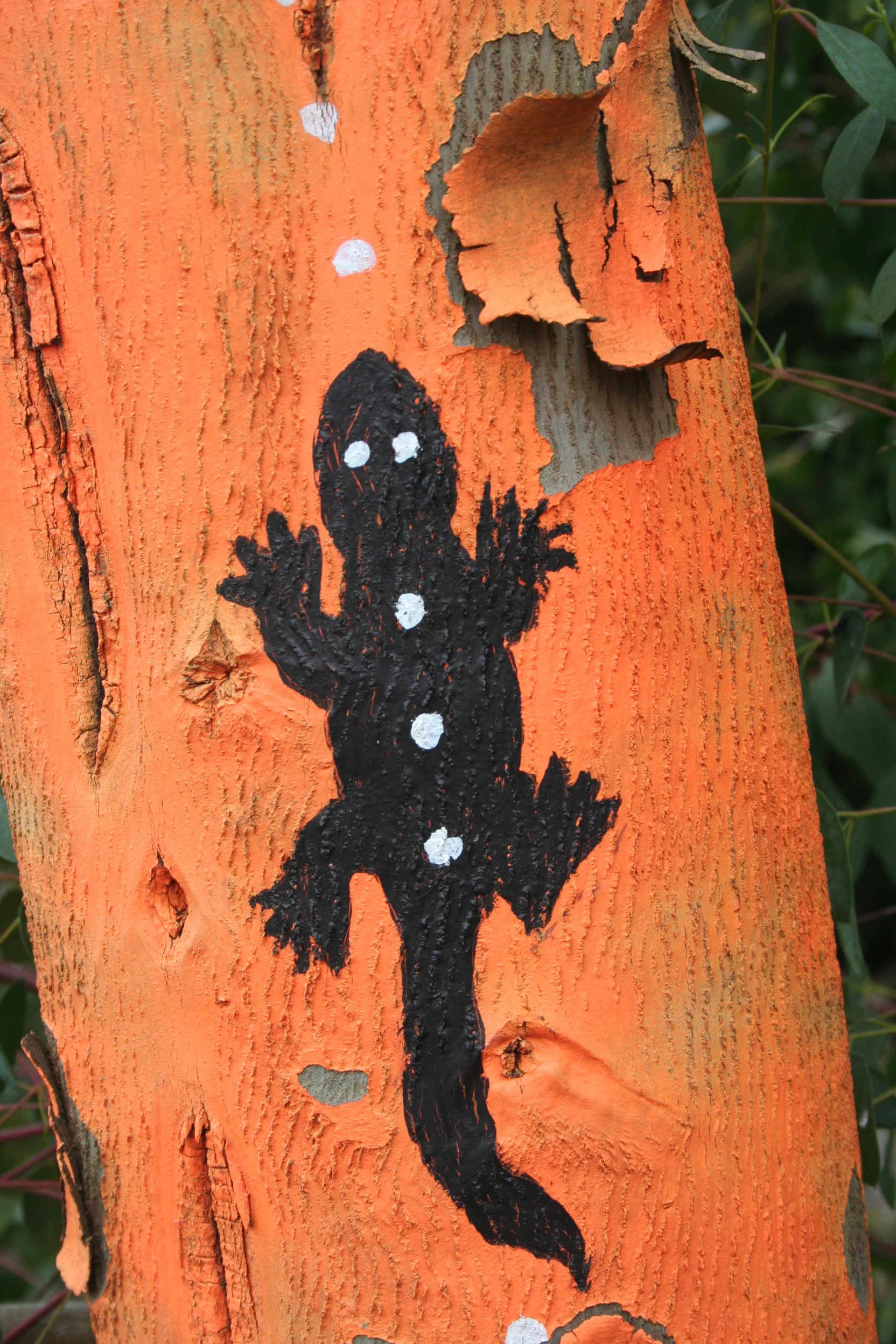Eucalyptus Arboretum
Tom was recognized as having the National Collection of Eucalypts in July 2009, with around 100 different provenances. The World Garden was invited to build a stand at the Hampton Court Palace Flower Show in July 2011 in the Plant Heritage Tent, exhibiting a range of species from Tom's national collection, for which we won a Silver Gilt Medal.
Some trees are more well-established than others so they are of varying heights, including Eucalyptus neglecta (Omeo Gum) the largest known Eucalyptus in the UK, originally from Eastern Victoria (South East Australia). On the particularly tall trees the long strips of peeling bark are amazing and the emerging patterns on the tree trunks, not to mention the scents, are a feast for the senses.
The story...
In early 1999, Tom received a generous grant from the Royal Horticultural Society & Kent Gardens Trust to collect seed of potentially hardy woody plants in Tasmania. Tom travelled for four months to high altitude regions where persistent frost, snow and freezing winds occur. Tom's thinking was that Eucalyptus species growing in these, frost prone locations might prove hardy in our comparatively benign UK climate.
He collected seed from many beauties, incluyding Eucalyptus vernicosa (“Varnished Gum”), the world’s smallest Eucalypt reaching only a couple of feet at maturity. Many Eucalyptus species are endangered, including Eucalyptus morrisbyi. This is a very ornamental, reasonably frost hardy, medium sized, semi weeping, coastal species. As a result of Tom's seed collecting, it was introduced to Europe for the first time. The Millennium Seed Bank at Wakehurst Place has since asked for seed.
The Royal Botanic Gardens Kew and Edinburgh, the RHS Gardens Wisley and Rosemoor have also benefited from seed collected on this expedition, with many specimens of rare species in unusual leaf and habit forms growing at these institutes.In total, Tom collected 100 provenances, leading to the establishment of Lullingstone's national collection.
Did you know...?
? The world’s tallest flowering plant is a Eucalyptus - Eucalyptus regnans, commonly called “Mountain Ash”. Currently, the tallest of these giant grows in Tasmania, at a height of 101m (333ft) and is estimated to be some 400 years old.
? Eucalypts (plural for Eucalyptus) are evergreen, woody plants that try to deliberately set themselves on fire. Often referred to as ‘suicide trees’, Eucalypts have developed fire promoting traits such as volatile leaf oils, copious litter production, and highly flammable bark. The intense heat produced by these burning oils during a bush fire kills all surrounding competition.
? Eucalypts are also known as ‘Gum Trees’ because many species exude copious sap from any break in the bark.
? The most commonly planted Eucalyptus in the UK is Eucalyptus gunnii. There are thought to be more of this species planted in the UK for ornamental purposes than are growing in the wilds of Central and NE Tasmania. Commonly called “Cider Gum” – because the Aborigines used to collect then ferment the tree’s sap to create a strong alcoholic drink.
? Only one species of Eucalyptus occurs in the Northern hemisphere – Eucalyptus deglupta from the Southern Philippines.
? The most widely planted exotic tree in the world is Eucalyptus camaldulensis, “The River Red Gum” – originally used in lowering water tables, its thirst could drain swamps to reduce the risk of malaria and is now used like many other species of Eucalyptus for a quick source of firewood, as a soil stabilizer, a flood preventer and for reforestation purposes.
? Eucalyptus is of great commercial importance throughout the world. Eucalypts are often rapid growers and in a matter of a few years a crop can be harvested for timber in the role of construction, telegraph poles and wood pulp, which is the basis of huge paper industries.
? Eucalyptus oil, called cineole oil, is a steamed distilled product that’s extracted from Eucalyptus leaves. It has a history of wide-ranging applications such as a spicy and aromatic flavouring for food and beverages, as a fragrance for detergents and candles (or, conversely, to repel insects), and for medicinal purposes to stimulate the immune system, as an anti-inflammatory and antibacterial antiseptic and to control asthma.
? Its most famous human use must be its ‘soothing yet cold blasting’ qualities for flu. Eucalyptus is an essential ingredient in products such as Vicks Vaporub, lozenges and inhalers. To this day Australian Aboriginals use Eucalyptus leaf infusions as a traditional medicine for treating body pains, sinus congestions, fever and colds.


